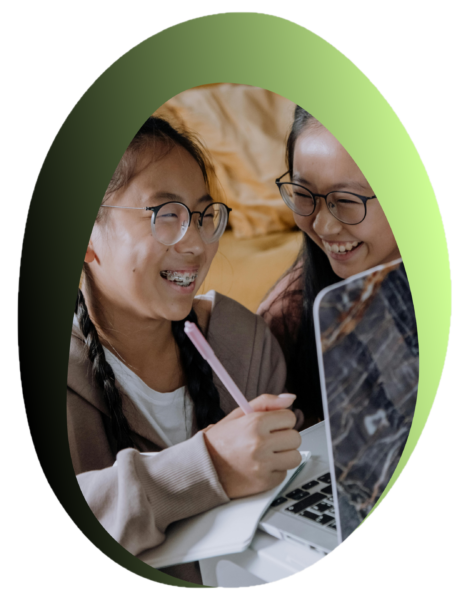
Aile World School
Where Education Meets Innovation and Sustainability
High School
World Green Hub High School Diploma/ SAT Program, is a six-year learning journey designed to provide students aged 11-12 with a comprehensive education that culminates in a high school diploma. Our program, starting at Grade 7 and concluding at Grade 12, is delivered through an innovative virtual platform complemented by physical Green Hubs, where students can engage in hands-on learning and community projects.
Diploma/Sat Curriculum Overview
Grade 7-12 High School
Grade 7 (Foundation Year):
- Students transition from primary education, focusing on building core academic skills and exploring new subjects.
- Curriculum centers on English, Mathematics, Science, Social Studies, and an Introduction to Technology.
- Emphasis on developing study habits, critical thinking, and research skills.
- Engagement with environmental science and sustainability woven through all subjects.
Grade 8 (Exploratory Year):
- Students continue core subjects, with the addition of World Languages and the Arts.
- Exploration of personal interests through elective courses such as Environmental Studies, Creative Writing, and Coding.
- Development of collaborative skills through group projects and virtual lab activities.
- Participation in virtual and physical Green Hub community service initiatives.
Grade 9 (Intermediate Year):
- Consolidation of foundational knowledge in core subjects, preparing for more advanced coursework.
- Introduction to elective tracks that allow students to delve deeper into areas of interest, including STEM, Humanities, Business, and more.
- Emphasis on real-world applications of learning and the development of personal projects related to sustainability.
- Encouragement of leadership skills through student-led virtual clubs and Green Hub events.
Grade 10 (Preparation Year):
- Students begin to specialize, selecting courses that align with their future goals and the high school diploma requirements.
- Advanced coursework in chosen elective tracks, with continued core subject study.
- Opportunities for internships or mentorship experiences through the Green Hub network.
- Focus on college and career readiness, with guidance counseling and portfolio development.
Grade 11 (Preliminary Diploma Year):
- In-depth study in elective tracks, with the potential for dual enrollment in college-level courses or vocational training.
- Completion of a capstone project or extended essay that demonstrates mastery in a chosen field of study.
- Leadership roles in virtual and Green Hub communities, fostering global citizenship and environmental advocacy.
- Preparation for standardized tests (e.g., SAT, ACT) and college admissions processes.
Grade 12 (Diploma Year):
- Final year of high school, with a focus on completing diploma requirements and preparing for post-secondary transitions.
- Advanced Placement (AP) or International Baccalaureate (IB) course options for students aiming for college credit or a more rigorous academic challenge.
- Finalization of college applications, scholarship searches, and financial aid planning with the support of guidance counselors.
- Presentation and defense of capstone projects or extended essays, showcasing students’ expertise and readiness for higher education or careers.
Core Subjects Throughout Grades 7-12:
English Language Arts:
- Development of reading, writing, speaking, and listening skills through the study of literature, language, and composition.
- Emphasis on critical analysis, persuasive writing, and research-based projects.
- Preparation for standardized tests and enhancement of communication skills for a variety of purposes and audiences.

Mathematics:
- Progressive curriculum from pre-algebra to calculus, including statistics and probability.
- Application of mathematical concepts to solve real-world problems, with a special focus on environmental data analysis and sustainable practices.
- Support for students at all levels to ensure mastery of concepts and readiness for college-level math.
Science:
- Integrated approach to physical, life, and earth sciences, with opportunities for specialization in later years.
- Hands-on experiments and virtual simulations to complement theoretical learning.
- Exploration of global environmental issues and scientific solutions to real-world challenges.
Social Studies:
- Study of history, geography, government, economics, and cultural studies to build a well-rounded understanding of the world.
- Critical examination of current events and their historical contexts, with a focus on sustainable development and global interdependence.
- Development of civic awareness and engagement through community-based projects and advocacy work.
World Languages:
- Acquisition of a second language, with a choice of languages that reflect global diversity and relevance.
- Focus on communicative competence, cultural understanding, and language as a tool for global citizenship.
Elective Subjects and Tracks:
- A variety of elective courses allow students to explore interests and potential career paths, including Environmental Science, Computer Programming, Digital Arts, Business and Entrepreneurship, and more.
- Specialized tracks guide students toward in-depth study in areas such as STEM, Humanities, Arts, or Vocational Skills.
Extracurricular Activities and Personal Development:
- Students are encouraged to participate in virtual clubs, competitions, and collaborative projects that align with their interests and contribute to their personal growth and academic portfolio.
- Leadership opportunities within these extracurricular activities help students develop skills such as teamwork, time management, and public speaking.
- Physical Green Hubs provide spaces for hands-on learning experiences, environmental projects, and community engagement activities.
Assessment and Progress Monitoring:
- Ongoing assessments, including formative and summative evaluations, to ensure students are meeting learning objectives and are on track with their diploma goals.
- Regular feedback from instructors and peers to support continuous improvement and mastery of content.
- Standardized testing preparation integrated into the curriculum to ready students for college admissions exams.
College and Career Readiness:
- Career exploration activities, including job shadowing, internships, and interviews with professionals from various fields.
- College preparation workshops covering application processes, essay writing, and interview techniques.
- Personalized guidance counseling to help students make informed decisions about post-secondary education and career paths.
Community & Environmental Engagement:
- Students participate in local and global initiatives that promote sustainability and environmental consciousness.
- The Green Hub network offers opportunities for students to engage in real-world problem-solving and contribute to positive change.
- Projects and collaborations that encourage students to think globally and act locally, reinforcing World Green Hub School’s commitment to creating a greener, more sustainable future.
Capstone Experience:
- In the final year, students complete a capstone project or extended research essay that reflects their learning journey and area of interest.
- The capstone experience includes a presentation or defense in front of peers, faculty, and community members, demonstrating the student’s proficiency and readiness for the next steps in their educational or career journey.
Core Subjects
English Language Arts (Grades 7-12):
Grades 7-9 (Building Foundations):
- Literature: Exposure to a variety of genres including novels, short stories, poetry, and plays from diverse cultures and historical periods.
- Writing: Development of writing skills across different forms: narrative, expository, persuasive, and research papers.
- Grammar and Vocabulary: Systematic study of grammar, usage, and vocabulary expansion.
- Speaking and Listening: Opportunities for public speaking, presentations, debates, and active listening exercises.
- Media Literacy: Analysis of media sources for bias, message, and intent.
Grades 10-12 (Refinement and Specialization):
- Advanced Literature: In-depth analysis of complex texts and critical engagement with literary theory.
- Composition: Refining writing styles for academic and professional purposes, including advanced research papers and literary analysis.
- Language Conventions: Mastery of grammar, style, and rhetoric in writing and speaking.
- Oral Communication: Advanced public speaking, including persuasive, informative, and impromptu speeches.
- Media and Digital Literacy: Creating and critiquing digital content and understanding the influence of digital media.

Mathematics (Grades 7-12):
Grades 7-9 (Core Concepts):
- Arithmetic and Pre-Algebra: Fundamental operations, fractions, decimals, ratios, and introduction to algebraic thinking.
- Geometry: Basic geometric shapes, theorems, and proofs, volume, and area calculations.
- Data Analysis: Introduction to statistics, graphing, and simple probability.
- Algebra I: Solving equations, inequalities, and an introduction to functions and graphing.
Grades 10-12 (Advanced Topics):
- Algebra II: Complex equations, systems of equations, quadratic functions, and polynomials.
- Geometry: Advanced study including trigonometry, circles, and advanced proofs.
- Pre-Calculus and Trigonometry: Functions, complex numbers, trigonometric identities, and applications.
- Calculus: (Optional) Limits, derivatives, integrals, and their applications.
- Statistics: (Optional) Probability distributions, hypothesis testing, and inferential statistics.
Science (Grades 7-12 ):
Grades 7-9 (Foundational Science):
- Life Science: Cell biology, genetics, ecosystems, and evolution.
- Physical Science: Basic chemistry including atoms, elements, and reactions; introduction to physics concepts such as force and energy.
- Earth Science: Study of geology, meteorology, oceanography, and environmental science.
- Scientific Inquiry: Developing skills in the scientific method, conducting experiments, data analysis, and presentation.
Grades 10-12 (Specialized Science):
- Biology: In-depth exploration of biological systems, molecular biology, biotechnology, and ecology.
- Chemistry: Advanced chemical reactions, stoichiometry, thermodynamics, organic chemistry, and biochemistry.
- Physics: Detailed study of mechanics, electromagnetism, thermodynamics, optics, and modern physics.
- Environmental Science: (Optional) Focused study on sustainability, conservation, climate change, and human impact on the environment.
- Science Electives: Opportunities for courses such as Anatomy and Physiology, Astronomy, Marine Biology, or Forensic Science, depending on student interest.
Social Studies (Grades7-12):
Grades 7-9 (Broad Overview):
- World History: Survey of ancient civilizations through modern history, focusing on major events, movements, and figures.
- Geography: Understanding physical and human geography, mapping skills, and global interconnections.
- Civics: Basics of government, citizenship, and the role of individuals in a democratic society.
- Economics: Introduction to economic principles, personal finance, and the global economy.
Grades 10-12 (In-depth Study):
- U.S. History: (or the history of the student’s home country) Comprehensive study from the founding to contemporary issues.
- Global Studies: Examination of global issues, international relations, and the impact of globalization.
- Government and Politics: Detailed study of political systems, ideologies, and the functioning of local, national, and international governance.
- Economics: Advanced topics in microeconomics and macroeconomics, economic theory, and application.
- Social Studies Electives: Courses such as Psychology, Sociology, Anthropology, or Philosophy to be offered to explore human behavior and thought.
World Languages (Grades 7-12):
Grades 7-9 (Language Acquisition):
- Introduction to Language: Basic communication skills in reading, writing, speaking, and listening in a chosen language.
- Cultural Studies: Exploration of the culture, traditions, and history associated with the chosen language to promote cultural understanding and appreciation.
- Language Foundations: Building a solid grammatical foundation and vocabulary base to enable simple conversations and comprehension of written texts.
Grades 10-12 (Language Proficiency and Fluency):
- Intermediate to Advanced Language Skills: Development of more sophisticated language abilities, enabling students to engage in conversations, understand native speakers, and express complex ideas.
- Literature and Media: Study of authentic materials such as literature, films, and news media in the target language to enhance comprehension and analytical skills.
- Advanced Communication: Focus on refining writing and speaking skills to achieve fluency and accuracy, preparing students for potential language proficiency examinations or certifications.
- Cultural Immersion: Virtual exchange programs, interactions with native speakers, and participation in cultural events to deepen understanding and practical use of the language in real-life contexts.
The curriculum at World Green Hub is designed to give students a well-rounded education that prepares them for the academic rigor of higher education, as well as for the challenges of living and working in a global, interconnected, and environmentally-conscious society. Through our virtual platform and physical Green Hub connections, students gain access to innovative learning experiences, practical applications of their knowledge, and a supportive community that encourages personal growth and social responsibility.
